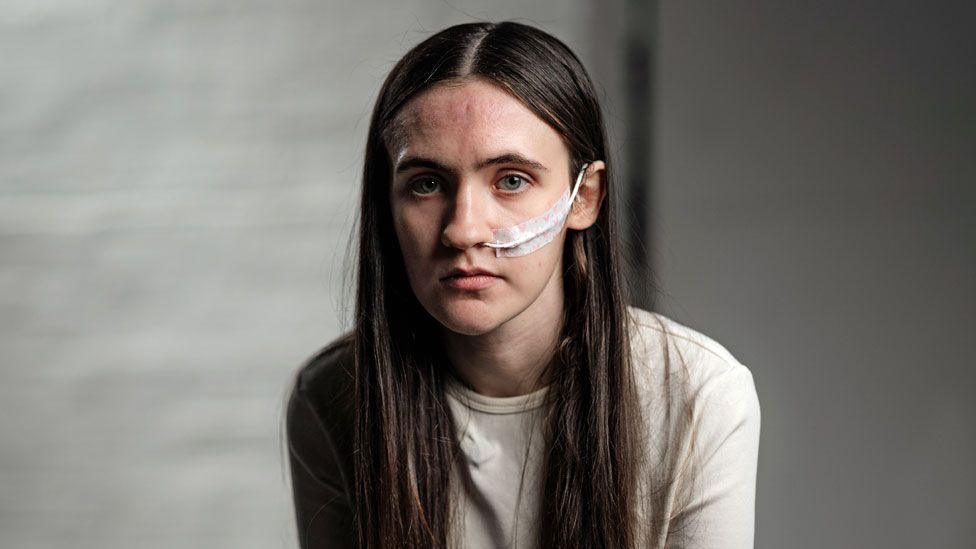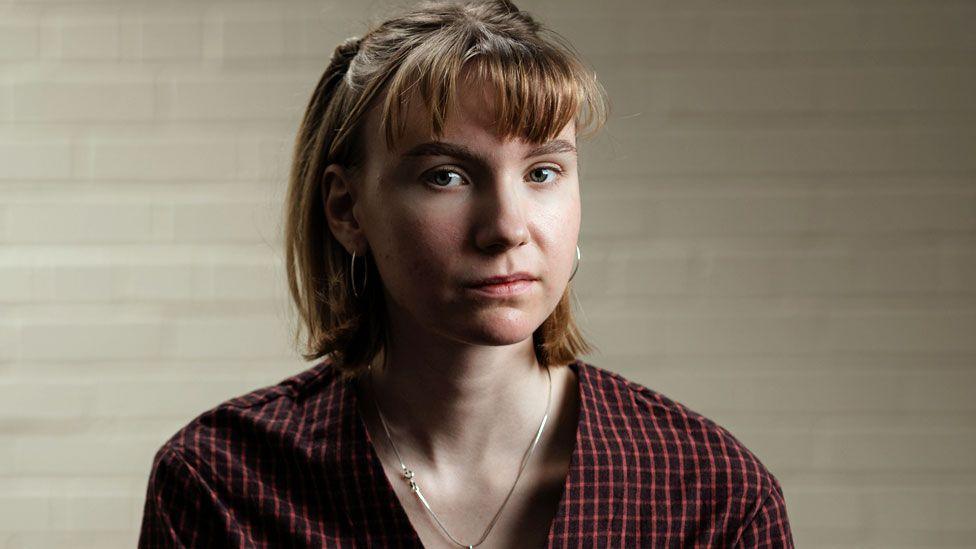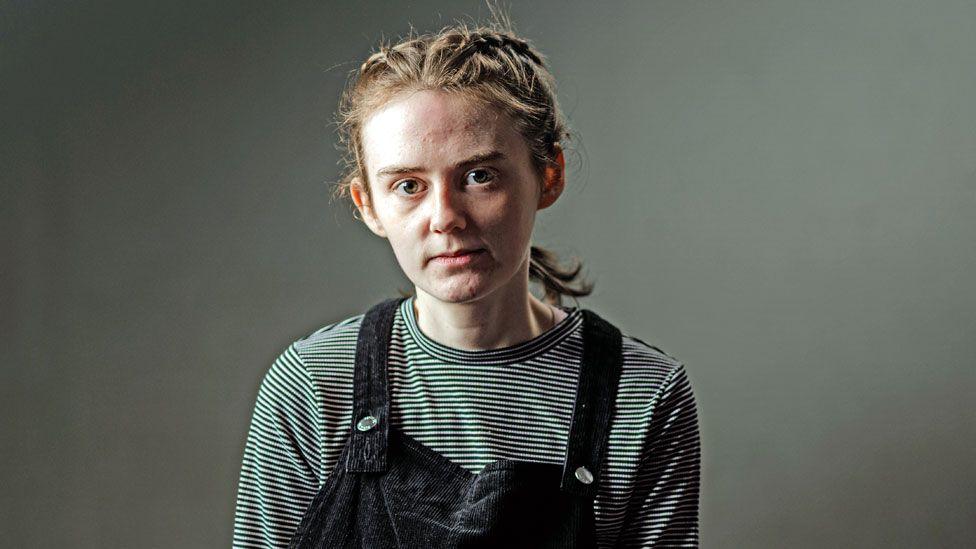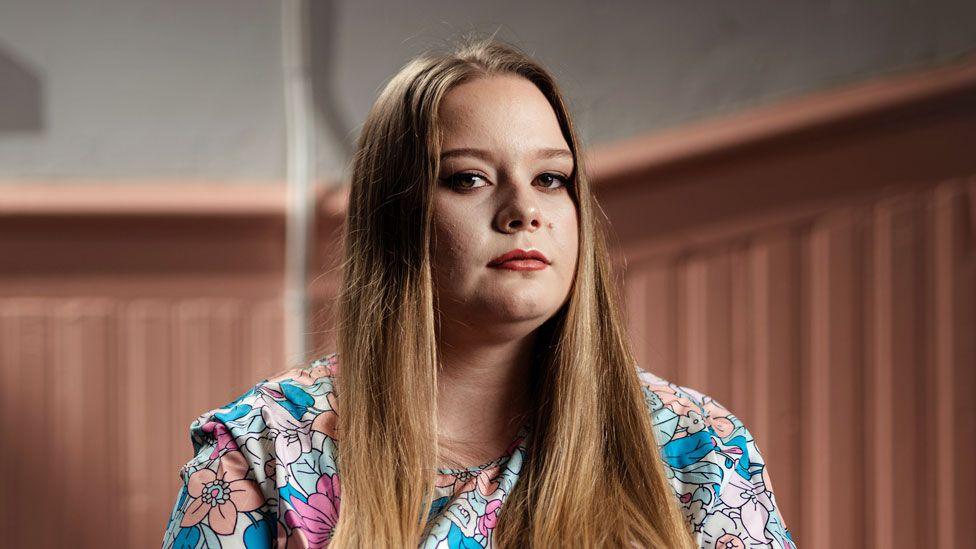Teenagers mocked by nurses at psychiatric unit
Child psychiatric care 'was more like abuse'
- Published
Former patients at Scotland's biggest children's psychiatric hospital have spoken out about a culture of cruelty among nursing staff.
Patients who were teenagers when they were admitted to Skye House, a specialist NHS unit in Glasgow, told BBC Disclosure some nurses called them "pathetic" and "disgusting" - and even mocked their suicide attempts.
"It was almost as if I was getting treated like an animal," one young patient, being treated for anorexia, said.
NHS Greater Glasgow and Clyde said it was "incredibly sorry" and has launched two inquiries into the allegations uncovered by the BBC's investigation.
Programme-makers spoke to 28 former patients while making BBC Disclosure's Kids on The Psychiatric Ward documentary.
One said the 24-bed psychiatric hospital, which sits in the grounds of Glasgow's Stobhill hospital, was like "hell".
"I'd say the culture of the nursing team was quite toxic. A lot of them, to be honest, were quite cruel a lot of the time," she added.
The young people, who were admitted between 2017 and 2024, told the programme that nurses quickly resorted to force, including physical restraint and dragging patients down corridors, leaving them bruised and traumatised.
One said she wanted the police to be called after an alleged assault but was afraid she would be treated worse.
Others reported the over-use of medication and sedative injections so the staff could have a quiet shift, leaving patients like "walking zombies".
Some patients said they were punished for being unwell, including being made to clean up their own blood from self-harm incidents.
Warning: Some readers may find details in this report distressing

Cara spent more than two years in the unit being treated for anorexia
Skye House, which opened in 2009, accepts children aged 12 to 18 who are usually at crisis point.
Most are detained under the Mental Health Act, which means they cannot leave until doctors decide they are fit to be discharged.
The BBC began investigating after one young patient reported her treatment at the unit.
Many other cases soon came to light.
Cara spent more than two years in the unit, from the age of 16, being treated for anorexia.
She was restrained more than 400 times over 18 months, medical records reviewed by the BBC showed.
She was often left with bruises and on one occasion a clump of her hair was pulled out.
"It traumatises you. You can't forget it," she said.
BBC Disclosure: Kids on the Psychiatric Ward
Young women tell their stories from years spent on an adolescent psychiatric ward
Watch now on iPlayer or at 8.00pm on Monday 10 February on BBC One Scotland
Up to five nurses could be involved in physically restraining someone to a bed or the floor if they were a danger to others or themselves.
Guidelines say restraints should only ever be used as a last resort, when all other de-escalation tactics have been exhausted.
Cara, now 21, would sometimes have to be restrained to prevent her from self-harming but says most of her restraints could have been avoided if staff had first attempted to speak to her instead of using restraints "as a first port of call".
She said one restraint in 2021 left her bruised and shaken.
"He held me down by the neck to the floor," Cara said.
"Quite scary, to have this man hovering over you, holding you down. His handprint was left around my neck."
On another occasion, Cara's medical notes reveal, she felt she had been assaulted after being pushed to the floor by the same nurse.
Cara had asked to call the police, only to later change her mind.
She told Disclosure this was because she was scared of the outcome.
"I just thought they might treat me worse than they already were," she said.

Jenna spent about nine months in the unit being treated for anorexia
When Jenna, from Inverness, was 16, she was suffering with depression, an eating disorder and had started to self-harm.
The nearest adolescent psychiatric unit was in Dundee but there were no beds and she was sent to Skye House.
"It was hell, like a prison kind of environment," Jenna said.
Jenna spent about nine months in the unit.
She was treated for anorexia by being fed through a nasogastric (NG) tube, a common but invasive treatment for malnourished people which involves threading a tube through the nose into the stomach.
Sometimes she would be restrained for this but she says the way staff administered this treatment has left her traumatised.
"Sometimes they would just come up to me and grab my arms and take me away," she said.
"I would just be dragged by however many nurses was needed."
She said sometimes staff would be so rough with her she'd be left bleeding and bruised.
"It was a kind of subtle punishment to teach me a lesson."
'I was constantly punished for things'
Self-harm behaviour was a feature in the lives of nearly all the patients who spoke to the BBC.
They claimed nursing staff would often miss mandatory 15-minute checks on patients, providing opportunities to hurt themselves.
Jenna and Cara told Disclosure there were occasions they had self-harmed and would be made to clean up their own blood from walls and floors.
Jenna said: "I remember the staff member kind of saying, 'You're disgusting, like that's disgusting, you need to clean that up'. It made me feel really horrible."
Cara said staff would sometimes be careless with her NG feeds and deliver the liquid too fast, causing her to vomit.
She said she would be made to clean her sick up herself.
Cara said: "They would give me wipes, and I'd be made to wipe the floor. It felt like a punishment, as if I'd done it on purpose.
"I just felt like I was constantly punished for things."

Stephanie was in Skye House for several admissions suffering from depression
Stephanie was in Skye House for several admissions suffering from depression, from 2020 when she was 16.
She said she had been left with trauma from her time there.
"The nurses never really treated you with care or compassion," she said.
"Instead of asking you what's wrong, they just put you on the floor and inject you with medication."
On one occasion Stephanie alleges she was assaulted by a staff member who became frustrated at her refusal to take a shower.
Stephanie said: "The nurse got angry with me.
"She's then dragged me off the bed by my legs, and turned a shower on, and put me in the shower with my clothes on. And then just walked away and left.
"At the time I just thought it was normal. Everybody else was really getting the same kind of treatment."
Jane Heslop is a retired NHS chief nurse who spent her career in child and adolescent mental health services and reviewed the BBC's evidence.
"It's abusive, it's completely wrong," she said.
"If that occurred as that young person described, it's absolutely and completely unacceptable."
Ms Heslop said that it appeared "some of these staff have lost some of their boundaries".

Abby is autistic and was admitted to Skye House at the age of 14
Abby is autistic and was admitted to Skye House at the age of 14 when she was self-harming and suicidal.
She was there for two and half years and says she felt bullied by staff, some of whom could be verbally abusive.
On one occasion, she said she was mocked for self-harming.
"The nurse came up to me and almost chuckled, like a kind of grin, and said 'You're being pathetic, like look at yourself'," Abby said.
"It felt like bullying sometimes. To the point where I just wanted to hurt myself.
"It felt true to me that if other people are seeing me as pathetic, I am pathetic."
Abby and her family believe she was over-medicated in Skye House.
She said: "A lot of the patients were like walking zombies, me included.
"Like a lot of the time we were just sedated to the point where I guess our personalities were dimmed."
Jenna said staff would over-use intramuscular sedative injections when patients were in distress.
Emergency medication should only be given as a last resort.
Jenna said: "Without kind of trying to talk to me first, or calm me down, they would just go straight to giving an [injection].
"I think to be honest it was so that they could have an easier shift whilst all their patients were kind of sedated."
'Incredibly sorry'
NHS Greater Glasgow and Clyde said a review of medication was carried out in 2023 and this changed the way medication was administered.
Dr Scott Davidson, medical director of NHS Greater Glasgow and Clyde, said he found the allegations "very difficult to listen to" and accepted there were instances where care has "been below the level we would expect for our young people".
"In light of these experiences and of the accounts of other patients, a full review of the quality of care has been launched," he said.
"We have also asked for an independent review of the unit."
The health board said it had made a number of improvements to patient care including staff recruitment and training of safe-holds.
It acknowledged that Skye House had faced staffing challenges in the past which meant agency and bank staff worked in the unit.
A statement said: "This was not ideal as they lacked experience in inpatient units and the complexities of the young people being cared for in Skye House."
It said action has since been taken to address staffing levels.
The Mental Welfare Commission for Scotland has visited Skye House six times since 2017.
The main issues raised in the BBC's investigation do not feature in any of its published reports.
If you've been affected by the issues in this story you can find information and support here.